Business Law Report: Unit 7 - Legal System and Business
VerifiedAdded on 2020/11/02
|27
|6773
|422
Report
AI Summary
This report provides a comprehensive overview of business law within the UK legal system. It begins with an introduction to the nature of the legal system, explaining different sources of law such as legislation, common law, EU law, and equity law. It then examines the role of government in law-making, including the parliamentary process, and evaluates the effectiveness of the legal system through recent reforms, including company and employment law. The report further illustrates the potential impact of the law on businesses by exploring company, employment, and contract law. It differentiates between legislation, regulations, and standards to analyze their impact on business. Moreover, it explores the formation of different types of business organizations, their management, and assesses their advantages and disadvantages. Finally, the report recommends appropriate legal solutions for resolving disputes, providing examples of obtaining legal advice and support, and evaluates the effectiveness of these solutions. The report is rich with examples, providing a critical evaluation of the legal system and its impact on businesses, making it a valuable resource for students on Desklib.
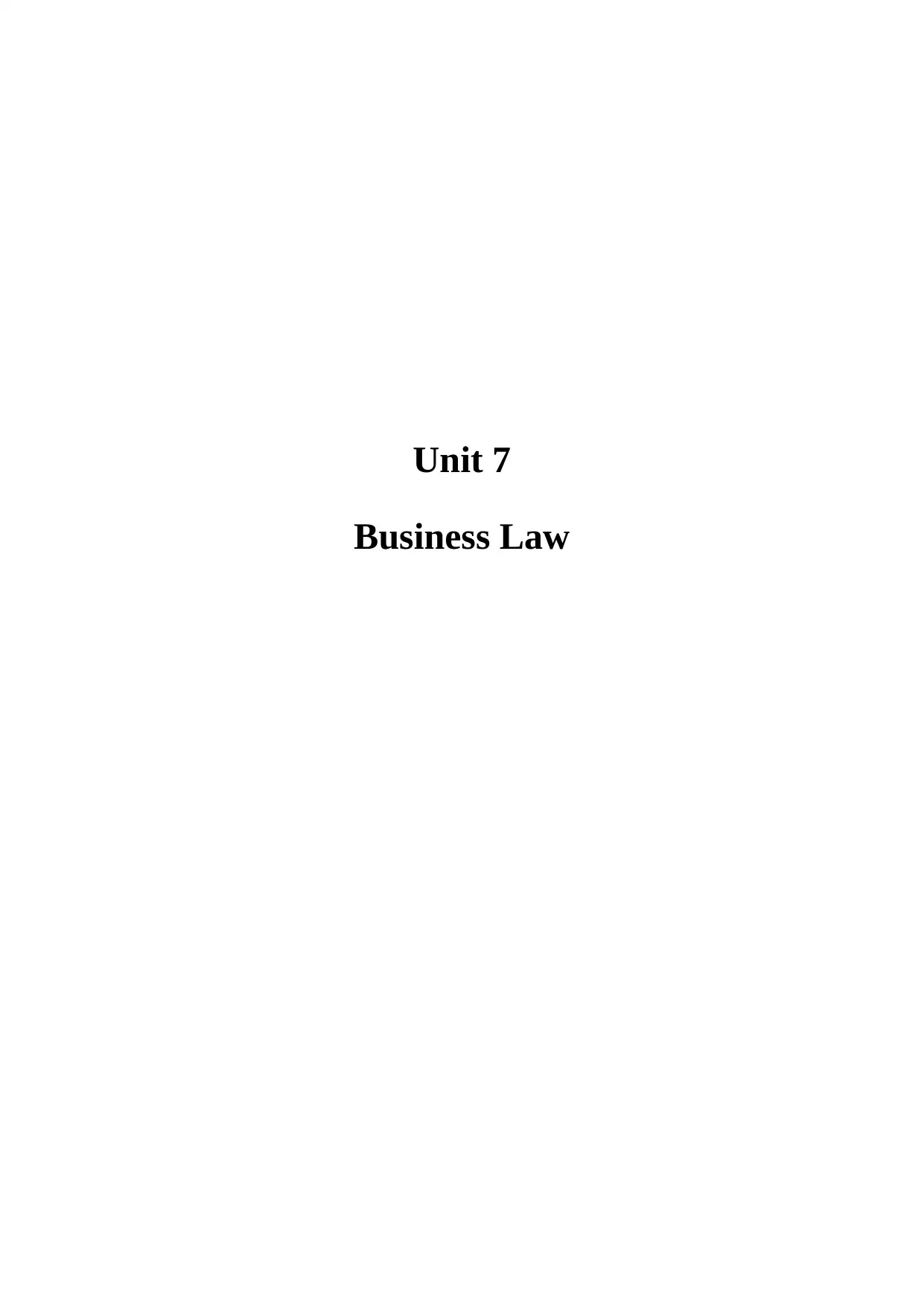
Unit 7
Business Law
Business Law
Paraphrase This Document
Need a fresh take? Get an instant paraphrase of this document with our AI Paraphraser
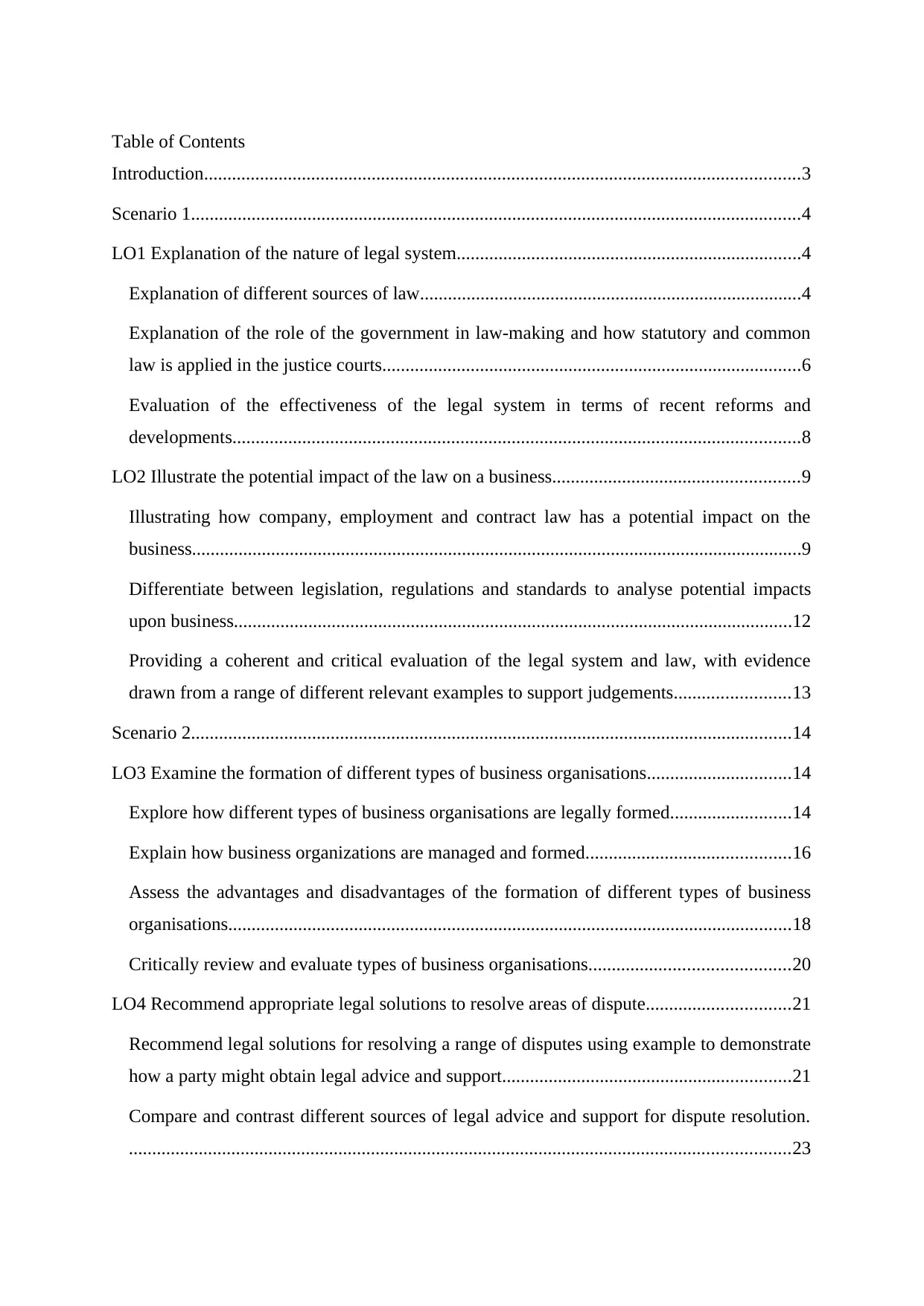
Table of Contents
Introduction................................................................................................................................3
Scenario 1...................................................................................................................................4
LO1 Explanation of the nature of legal system..........................................................................4
Explanation of different sources of law..................................................................................4
Explanation of the role of the government in law-making and how statutory and common
law is applied in the justice courts..........................................................................................6
Evaluation of the effectiveness of the legal system in terms of recent reforms and
developments..........................................................................................................................8
LO2 Illustrate the potential impact of the law on a business.....................................................9
Illustrating how company, employment and contract law has a potential impact on the
business...................................................................................................................................9
Differentiate between legislation, regulations and standards to analyse potential impacts
upon business........................................................................................................................12
Providing a coherent and critical evaluation of the legal system and law, with evidence
drawn from a range of different relevant examples to support judgements.........................13
Scenario 2.................................................................................................................................14
LO3 Examine the formation of different types of business organisations...............................14
Explore how different types of business organisations are legally formed..........................14
Explain how business organizations are managed and formed............................................16
Assess the advantages and disadvantages of the formation of different types of business
organisations.........................................................................................................................18
Critically review and evaluate types of business organisations...........................................20
LO4 Recommend appropriate legal solutions to resolve areas of dispute...............................21
Recommend legal solutions for resolving a range of disputes using example to demonstrate
how a party might obtain legal advice and support..............................................................21
Compare and contrast different sources of legal advice and support for dispute resolution.
..............................................................................................................................................23
Introduction................................................................................................................................3
Scenario 1...................................................................................................................................4
LO1 Explanation of the nature of legal system..........................................................................4
Explanation of different sources of law..................................................................................4
Explanation of the role of the government in law-making and how statutory and common
law is applied in the justice courts..........................................................................................6
Evaluation of the effectiveness of the legal system in terms of recent reforms and
developments..........................................................................................................................8
LO2 Illustrate the potential impact of the law on a business.....................................................9
Illustrating how company, employment and contract law has a potential impact on the
business...................................................................................................................................9
Differentiate between legislation, regulations and standards to analyse potential impacts
upon business........................................................................................................................12
Providing a coherent and critical evaluation of the legal system and law, with evidence
drawn from a range of different relevant examples to support judgements.........................13
Scenario 2.................................................................................................................................14
LO3 Examine the formation of different types of business organisations...............................14
Explore how different types of business organisations are legally formed..........................14
Explain how business organizations are managed and formed............................................16
Assess the advantages and disadvantages of the formation of different types of business
organisations.........................................................................................................................18
Critically review and evaluate types of business organisations...........................................20
LO4 Recommend appropriate legal solutions to resolve areas of dispute...............................21
Recommend legal solutions for resolving a range of disputes using example to demonstrate
how a party might obtain legal advice and support..............................................................21
Compare and contrast different sources of legal advice and support for dispute resolution.
..............................................................................................................................................23

Evaluate the effectiveness of legal solutions, legal advice and support for dispute
resolution..............................................................................................................................24
Conclusion................................................................................................................................25
References................................................................................................................................26
resolution..............................................................................................................................24
Conclusion................................................................................................................................25
References................................................................................................................................26
⊘ This is a preview!⊘
Do you want full access?
Subscribe today to unlock all pages.

Trusted by 1+ million students worldwide
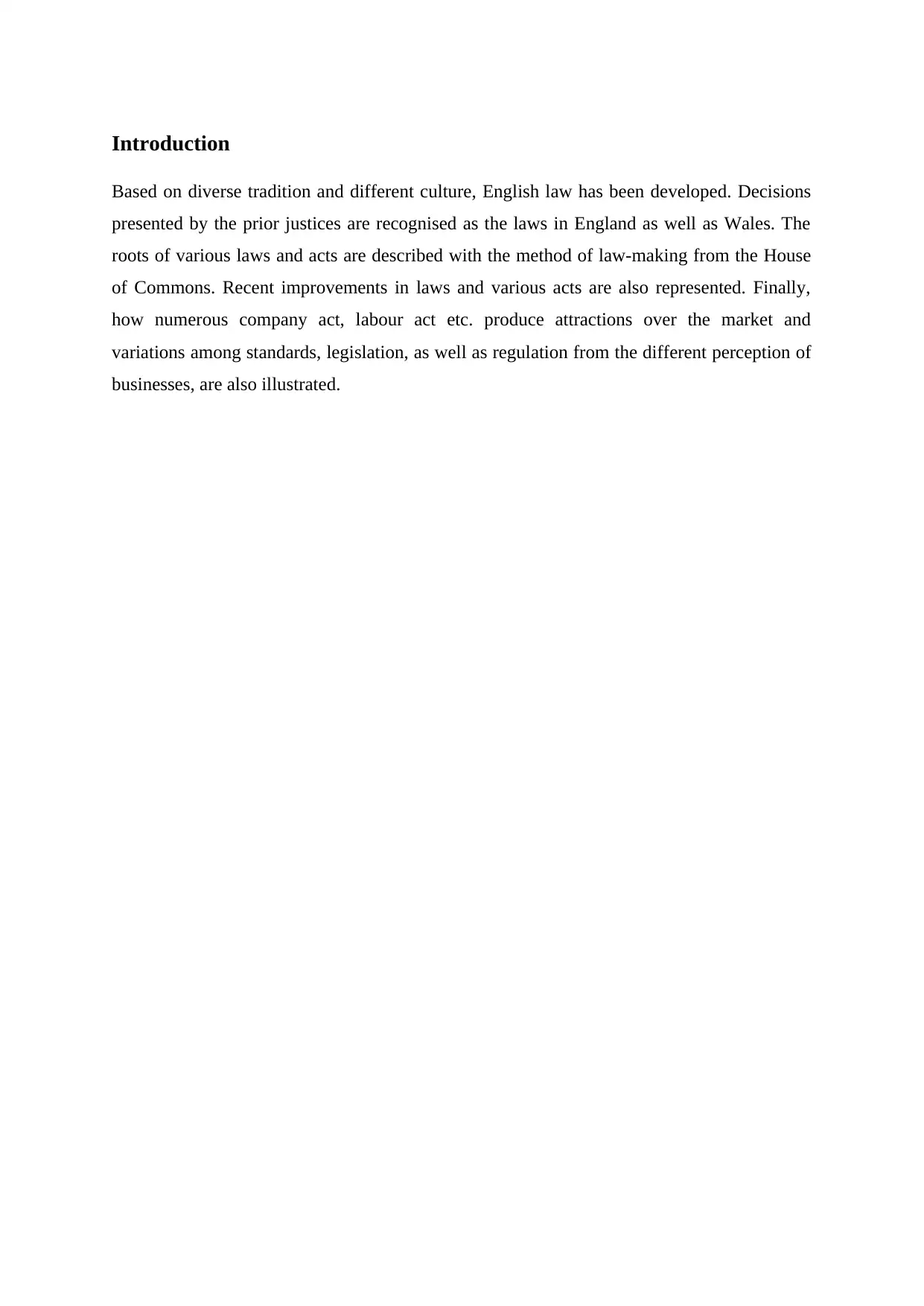
Introduction
Based on diverse tradition and different culture, English law has been developed. Decisions
presented by the prior justices are recognised as the laws in England as well as Wales. The
roots of various laws and acts are described with the method of law-making from the House
of Commons. Recent improvements in laws and various acts are also represented. Finally,
how numerous company act, labour act etc. produce attractions over the market and
variations among standards, legislation, as well as regulation from the different perception of
businesses, are also illustrated.
Based on diverse tradition and different culture, English law has been developed. Decisions
presented by the prior justices are recognised as the laws in England as well as Wales. The
roots of various laws and acts are described with the method of law-making from the House
of Commons. Recent improvements in laws and various acts are also represented. Finally,
how numerous company act, labour act etc. produce attractions over the market and
variations among standards, legislation, as well as regulation from the different perception of
businesses, are also illustrated.
Paraphrase This Document
Need a fresh take? Get an instant paraphrase of this document with our AI Paraphraser
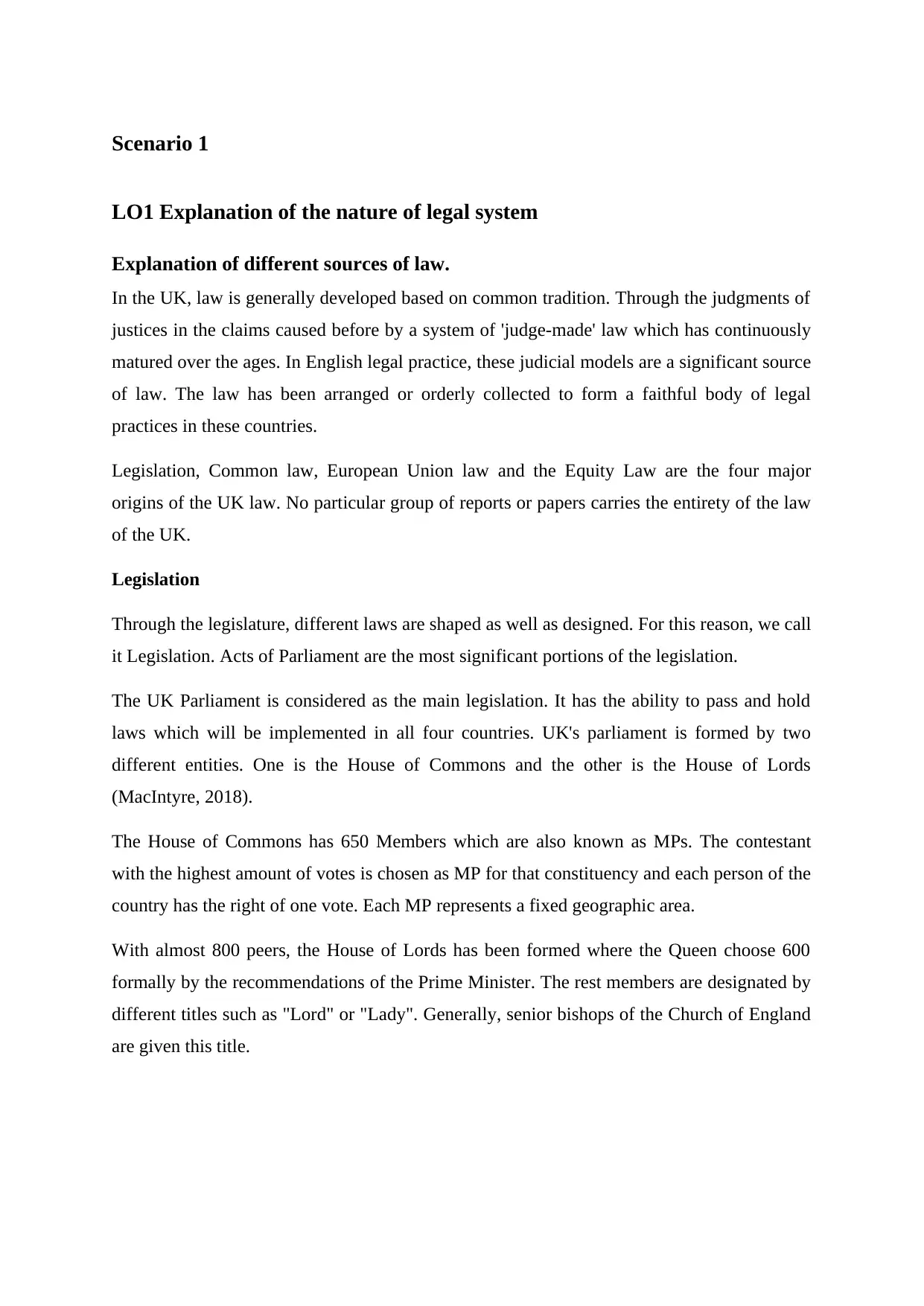
Scenario 1
LO1 Explanation of the nature of legal system
Explanation of different sources of law.
In the UK, law is generally developed based on common tradition. Through the judgments of
justices in the claims caused before by a system of 'judge-made' law which has continuously
matured over the ages. In English legal practice, these judicial models are a significant source
of law. The law has been arranged or orderly collected to form a faithful body of legal
practices in these countries.
Legislation, Common law, European Union law and the Equity Law are the four major
origins of the UK law. No particular group of reports or papers carries the entirety of the law
of the UK.
Legislation
Through the legislature, different laws are shaped as well as designed. For this reason, we call
it Legislation. Acts of Parliament are the most significant portions of the legislation.
The UK Parliament is considered as the main legislation. It has the ability to pass and hold
laws which will be implemented in all four countries. UK's parliament is formed by two
different entities. One is the House of Commons and the other is the House of Lords
(MacIntyre, 2018).
The House of Commons has 650 Members which are also known as MPs. The contestant
with the highest amount of votes is chosen as MP for that constituency and each person of the
country has the right of one vote. Each MP represents a fixed geographic area.
With almost 800 peers, the House of Lords has been formed where the Queen choose 600
formally by the recommendations of the Prime Minister. The rest members are designated by
different titles such as "Lord" or "Lady". Generally, senior bishops of the Church of England
are given this title.
LO1 Explanation of the nature of legal system
Explanation of different sources of law.
In the UK, law is generally developed based on common tradition. Through the judgments of
justices in the claims caused before by a system of 'judge-made' law which has continuously
matured over the ages. In English legal practice, these judicial models are a significant source
of law. The law has been arranged or orderly collected to form a faithful body of legal
practices in these countries.
Legislation, Common law, European Union law and the Equity Law are the four major
origins of the UK law. No particular group of reports or papers carries the entirety of the law
of the UK.
Legislation
Through the legislature, different laws are shaped as well as designed. For this reason, we call
it Legislation. Acts of Parliament are the most significant portions of the legislation.
The UK Parliament is considered as the main legislation. It has the ability to pass and hold
laws which will be implemented in all four countries. UK's parliament is formed by two
different entities. One is the House of Commons and the other is the House of Lords
(MacIntyre, 2018).
The House of Commons has 650 Members which are also known as MPs. The contestant
with the highest amount of votes is chosen as MP for that constituency and each person of the
country has the right of one vote. Each MP represents a fixed geographic area.
With almost 800 peers, the House of Lords has been formed where the Queen choose 600
formally by the recommendations of the Prime Minister. The rest members are designated by
different titles such as "Lord" or "Lady". Generally, senior bishops of the Church of England
are given this title.
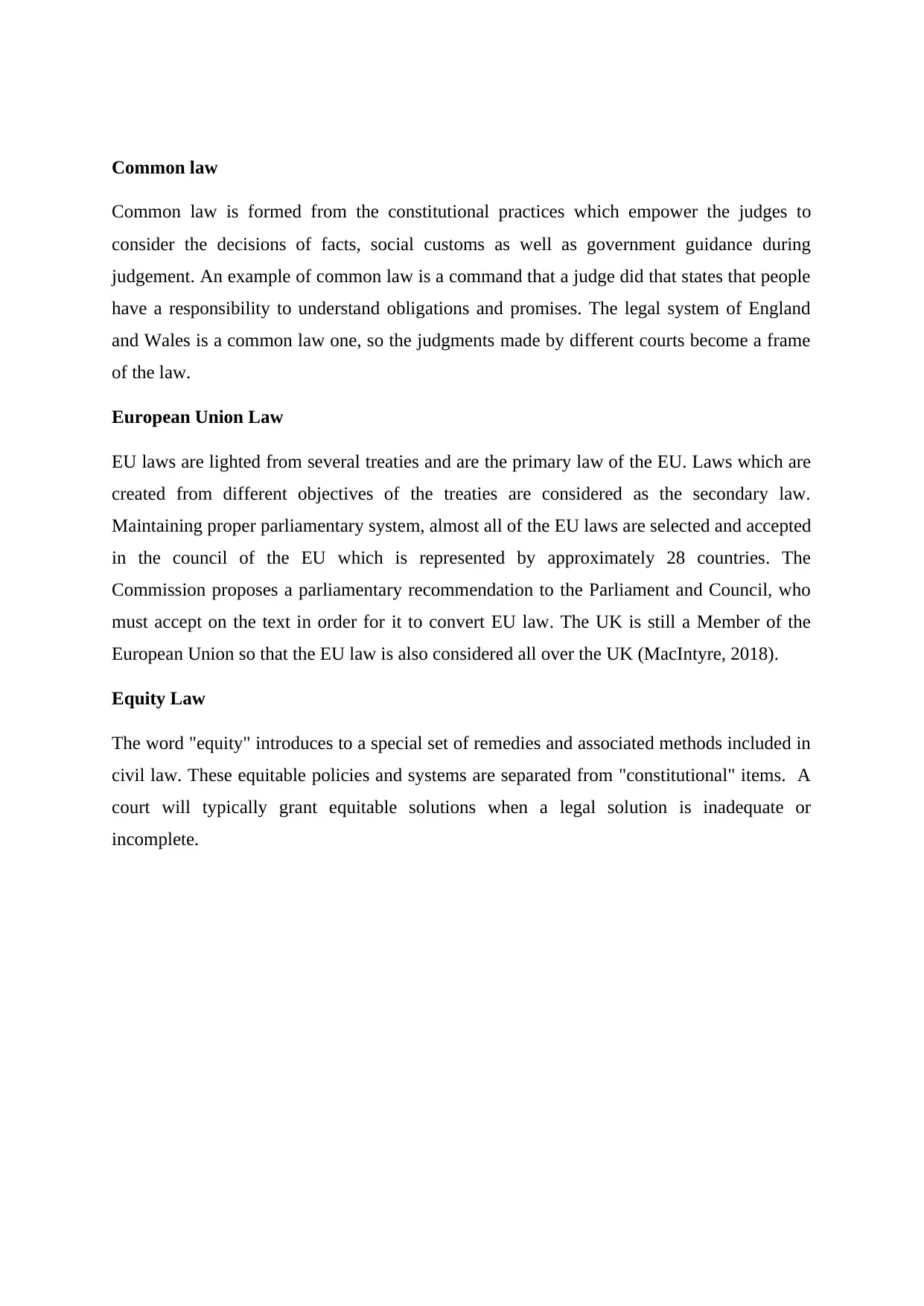
Common law
Common law is formed from the constitutional practices which empower the judges to
consider the decisions of facts, social customs as well as government guidance during
judgement. An example of common law is a command that a judge did that states that people
have a responsibility to understand obligations and promises. The legal system of England
and Wales is a common law one, so the judgments made by different courts become a frame
of the law.
European Union Law
EU laws are lighted from several treaties and are the primary law of the EU. Laws which are
created from different objectives of the treaties are considered as the secondary law.
Maintaining proper parliamentary system, almost all of the EU laws are selected and accepted
in the council of the EU which is represented by approximately 28 countries. The
Commission proposes a parliamentary recommendation to the Parliament and Council, who
must accept on the text in order for it to convert EU law. The UK is still a Member of the
European Union so that the EU law is also considered all over the UK (MacIntyre, 2018).
Equity Law
The word "equity" introduces to a special set of remedies and associated methods included in
civil law. These equitable policies and systems are separated from "constitutional" items. A
court will typically grant equitable solutions when a legal solution is inadequate or
incomplete.
Common law is formed from the constitutional practices which empower the judges to
consider the decisions of facts, social customs as well as government guidance during
judgement. An example of common law is a command that a judge did that states that people
have a responsibility to understand obligations and promises. The legal system of England
and Wales is a common law one, so the judgments made by different courts become a frame
of the law.
European Union Law
EU laws are lighted from several treaties and are the primary law of the EU. Laws which are
created from different objectives of the treaties are considered as the secondary law.
Maintaining proper parliamentary system, almost all of the EU laws are selected and accepted
in the council of the EU which is represented by approximately 28 countries. The
Commission proposes a parliamentary recommendation to the Parliament and Council, who
must accept on the text in order for it to convert EU law. The UK is still a Member of the
European Union so that the EU law is also considered all over the UK (MacIntyre, 2018).
Equity Law
The word "equity" introduces to a special set of remedies and associated methods included in
civil law. These equitable policies and systems are separated from "constitutional" items. A
court will typically grant equitable solutions when a legal solution is inadequate or
incomplete.
⊘ This is a preview!⊘
Do you want full access?
Subscribe today to unlock all pages.

Trusted by 1+ million students worldwide
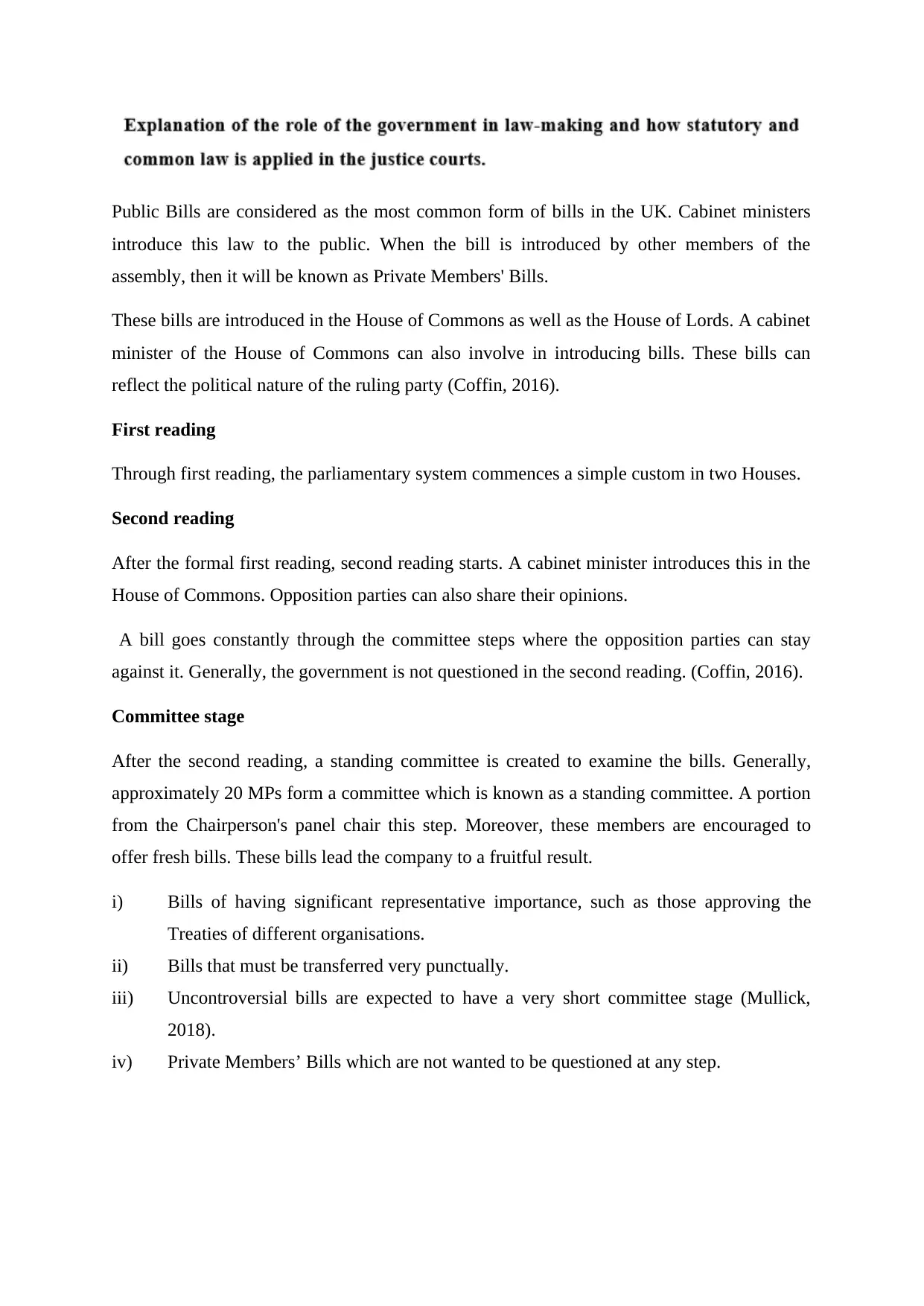
Public Bills are considered as the most common form of bills in the UK. Cabinet ministers
introduce this law to the public. When the bill is introduced by other members of the
assembly, then it will be known as Private Members' Bills.
These bills are introduced in the House of Commons as well as the House of Lords. A cabinet
minister of the House of Commons can also involve in introducing bills. These bills can
reflect the political nature of the ruling party (Coffin, 2016).
First reading
Through first reading, the parliamentary system commences a simple custom in two Houses.
Second reading
After the formal first reading, second reading starts. A cabinet minister introduces this in the
House of Commons. Opposition parties can also share their opinions.
A bill goes constantly through the committee steps where the opposition parties can stay
against it. Generally, the government is not questioned in the second reading. (Coffin, 2016).
Committee stage
After the second reading, a standing committee is created to examine the bills. Generally,
approximately 20 MPs form a committee which is known as a standing committee. A portion
from the Chairperson's panel chair this step. Moreover, these members are encouraged to
offer fresh bills. These bills lead the company to a fruitful result.
i) Bills of having significant representative importance, such as those approving the
Treaties of different organisations.
ii) Bills that must be transferred very punctually.
iii) Uncontroversial bills are expected to have a very short committee stage (Mullick,
2018).
iv) Private Members’ Bills which are not wanted to be questioned at any step.
introduce this law to the public. When the bill is introduced by other members of the
assembly, then it will be known as Private Members' Bills.
These bills are introduced in the House of Commons as well as the House of Lords. A cabinet
minister of the House of Commons can also involve in introducing bills. These bills can
reflect the political nature of the ruling party (Coffin, 2016).
First reading
Through first reading, the parliamentary system commences a simple custom in two Houses.
Second reading
After the formal first reading, second reading starts. A cabinet minister introduces this in the
House of Commons. Opposition parties can also share their opinions.
A bill goes constantly through the committee steps where the opposition parties can stay
against it. Generally, the government is not questioned in the second reading. (Coffin, 2016).
Committee stage
After the second reading, a standing committee is created to examine the bills. Generally,
approximately 20 MPs form a committee which is known as a standing committee. A portion
from the Chairperson's panel chair this step. Moreover, these members are encouraged to
offer fresh bills. These bills lead the company to a fruitful result.
i) Bills of having significant representative importance, such as those approving the
Treaties of different organisations.
ii) Bills that must be transferred very punctually.
iii) Uncontroversial bills are expected to have a very short committee stage (Mullick,
2018).
iv) Private Members’ Bills which are not wanted to be questioned at any step.
Paraphrase This Document
Need a fresh take? Get an instant paraphrase of this document with our AI Paraphraser
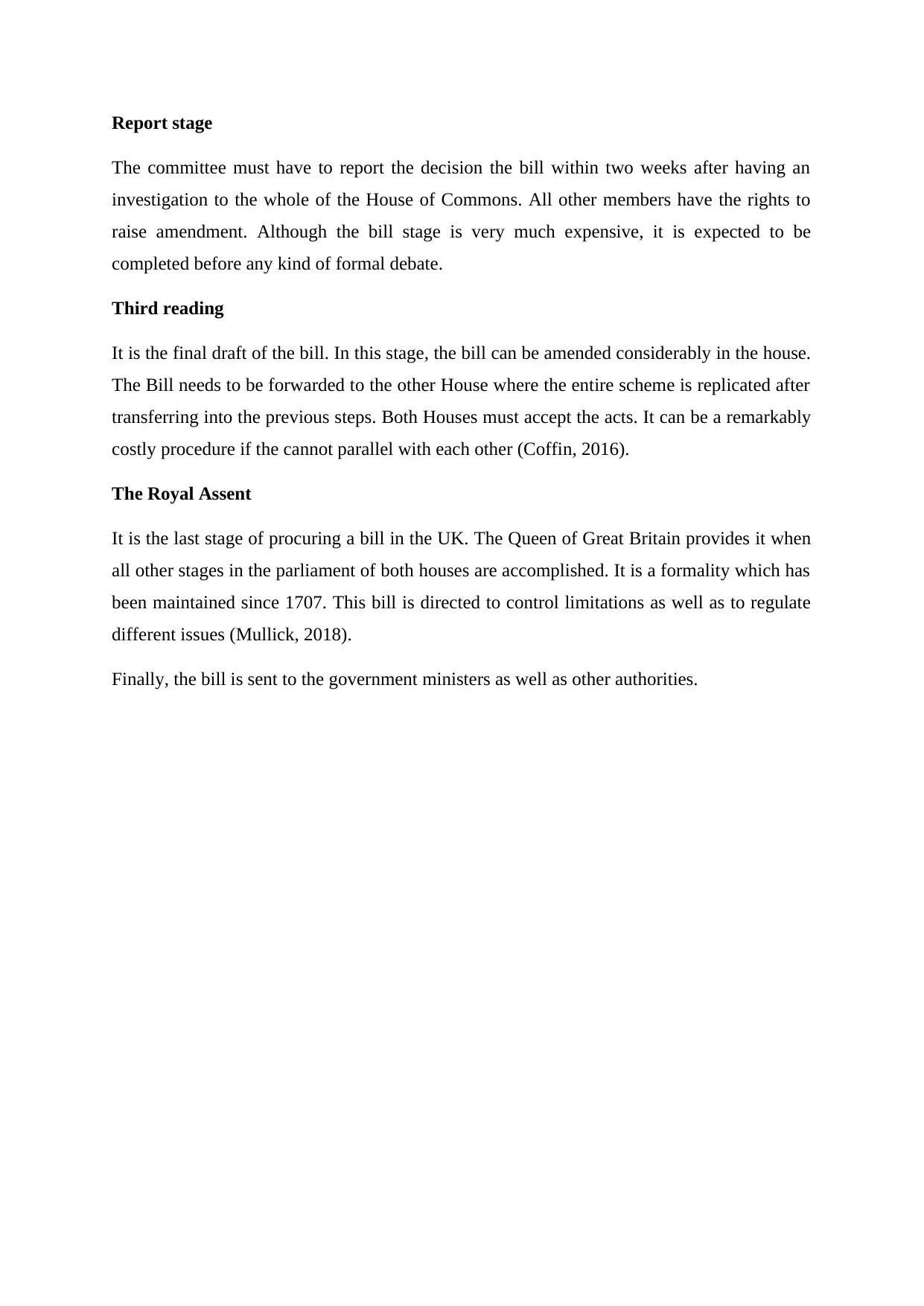
Report stage
The committee must have to report the decision the bill within two weeks after having an
investigation to the whole of the House of Commons. All other members have the rights to
raise amendment. Although the bill stage is very much expensive, it is expected to be
completed before any kind of formal debate.
Third reading
It is the final draft of the bill. In this stage, the bill can be amended considerably in the house.
The Bill needs to be forwarded to the other House where the entire scheme is replicated after
transferring into the previous steps. Both Houses must accept the acts. It can be a remarkably
costly procedure if the cannot parallel with each other (Coffin, 2016).
The Royal Assent
It is the last stage of procuring a bill in the UK. The Queen of Great Britain provides it when
all other stages in the parliament of both houses are accomplished. It is a formality which has
been maintained since 1707. This bill is directed to control limitations as well as to regulate
different issues (Mullick, 2018).
Finally, the bill is sent to the government ministers as well as other authorities.
The committee must have to report the decision the bill within two weeks after having an
investigation to the whole of the House of Commons. All other members have the rights to
raise amendment. Although the bill stage is very much expensive, it is expected to be
completed before any kind of formal debate.
Third reading
It is the final draft of the bill. In this stage, the bill can be amended considerably in the house.
The Bill needs to be forwarded to the other House where the entire scheme is replicated after
transferring into the previous steps. Both Houses must accept the acts. It can be a remarkably
costly procedure if the cannot parallel with each other (Coffin, 2016).
The Royal Assent
It is the last stage of procuring a bill in the UK. The Queen of Great Britain provides it when
all other stages in the parliament of both houses are accomplished. It is a formality which has
been maintained since 1707. This bill is directed to control limitations as well as to regulate
different issues (Mullick, 2018).
Finally, the bill is sent to the government ministers as well as other authorities.
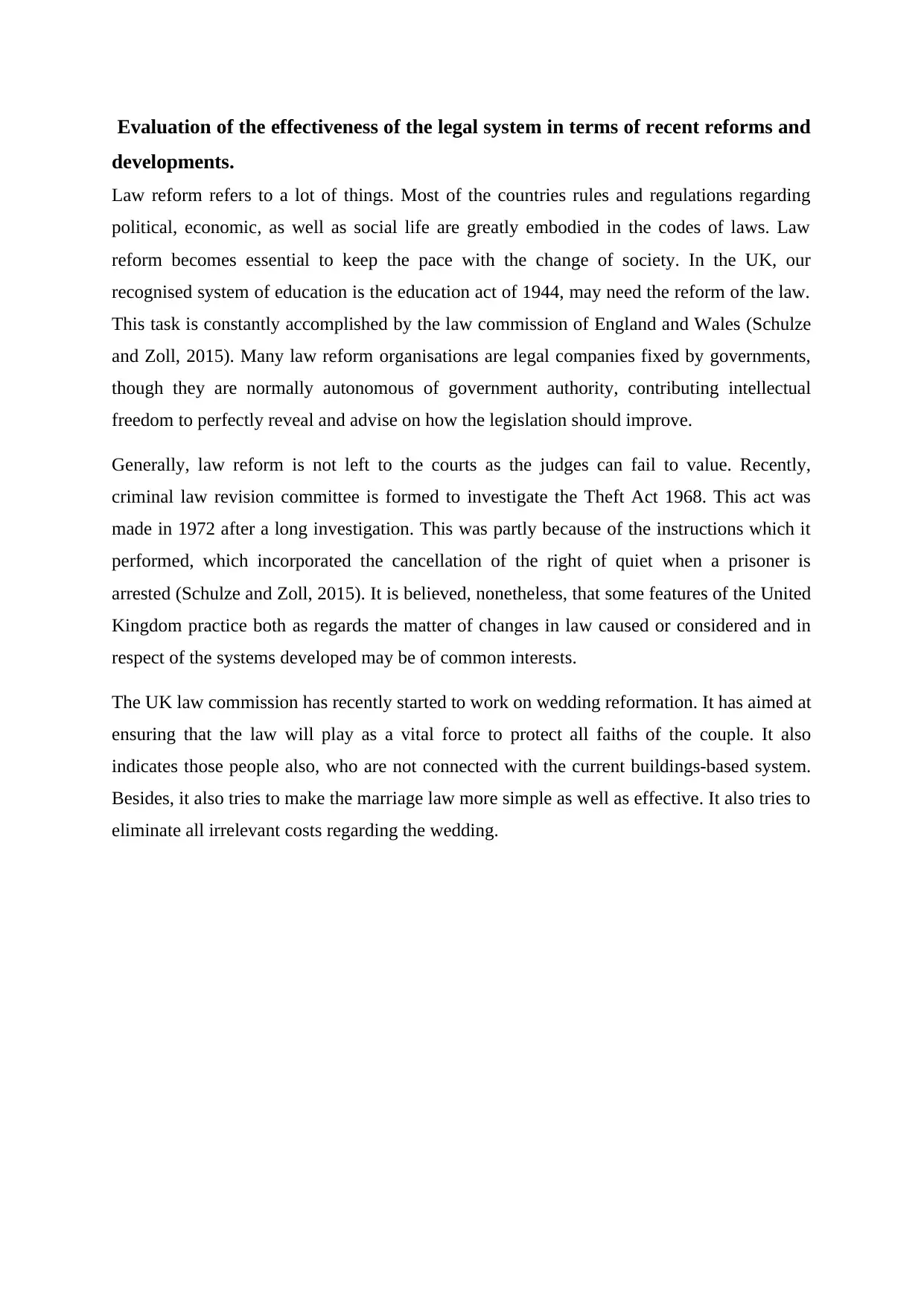
Evaluation of the effectiveness of the legal system in terms of recent reforms and
developments.
Law reform refers to a lot of things. Most of the countries rules and regulations regarding
political, economic, as well as social life are greatly embodied in the codes of laws. Law
reform becomes essential to keep the pace with the change of society. In the UK, our
recognised system of education is the education act of 1944, may need the reform of the law.
This task is constantly accomplished by the law commission of England and Wales (Schulze
and Zoll, 2015). Many law reform organisations are legal companies fixed by governments,
though they are normally autonomous of government authority, contributing intellectual
freedom to perfectly reveal and advise on how the legislation should improve.
Generally, law reform is not left to the courts as the judges can fail to value. Recently,
criminal law revision committee is formed to investigate the Theft Act 1968. This act was
made in 1972 after a long investigation. This was partly because of the instructions which it
performed, which incorporated the cancellation of the right of quiet when a prisoner is
arrested (Schulze and Zoll, 2015). It is believed, nonetheless, that some features of the United
Kingdom practice both as regards the matter of changes in law caused or considered and in
respect of the systems developed may be of common interests.
The UK law commission has recently started to work on wedding reformation. It has aimed at
ensuring that the law will play as a vital force to protect all faiths of the couple. It also
indicates those people also, who are not connected with the current buildings-based system.
Besides, it also tries to make the marriage law more simple as well as effective. It also tries to
eliminate all irrelevant costs regarding the wedding.
developments.
Law reform refers to a lot of things. Most of the countries rules and regulations regarding
political, economic, as well as social life are greatly embodied in the codes of laws. Law
reform becomes essential to keep the pace with the change of society. In the UK, our
recognised system of education is the education act of 1944, may need the reform of the law.
This task is constantly accomplished by the law commission of England and Wales (Schulze
and Zoll, 2015). Many law reform organisations are legal companies fixed by governments,
though they are normally autonomous of government authority, contributing intellectual
freedom to perfectly reveal and advise on how the legislation should improve.
Generally, law reform is not left to the courts as the judges can fail to value. Recently,
criminal law revision committee is formed to investigate the Theft Act 1968. This act was
made in 1972 after a long investigation. This was partly because of the instructions which it
performed, which incorporated the cancellation of the right of quiet when a prisoner is
arrested (Schulze and Zoll, 2015). It is believed, nonetheless, that some features of the United
Kingdom practice both as regards the matter of changes in law caused or considered and in
respect of the systems developed may be of common interests.
The UK law commission has recently started to work on wedding reformation. It has aimed at
ensuring that the law will play as a vital force to protect all faiths of the couple. It also
indicates those people also, who are not connected with the current buildings-based system.
Besides, it also tries to make the marriage law more simple as well as effective. It also tries to
eliminate all irrelevant costs regarding the wedding.
⊘ This is a preview!⊘
Do you want full access?
Subscribe today to unlock all pages.

Trusted by 1+ million students worldwide
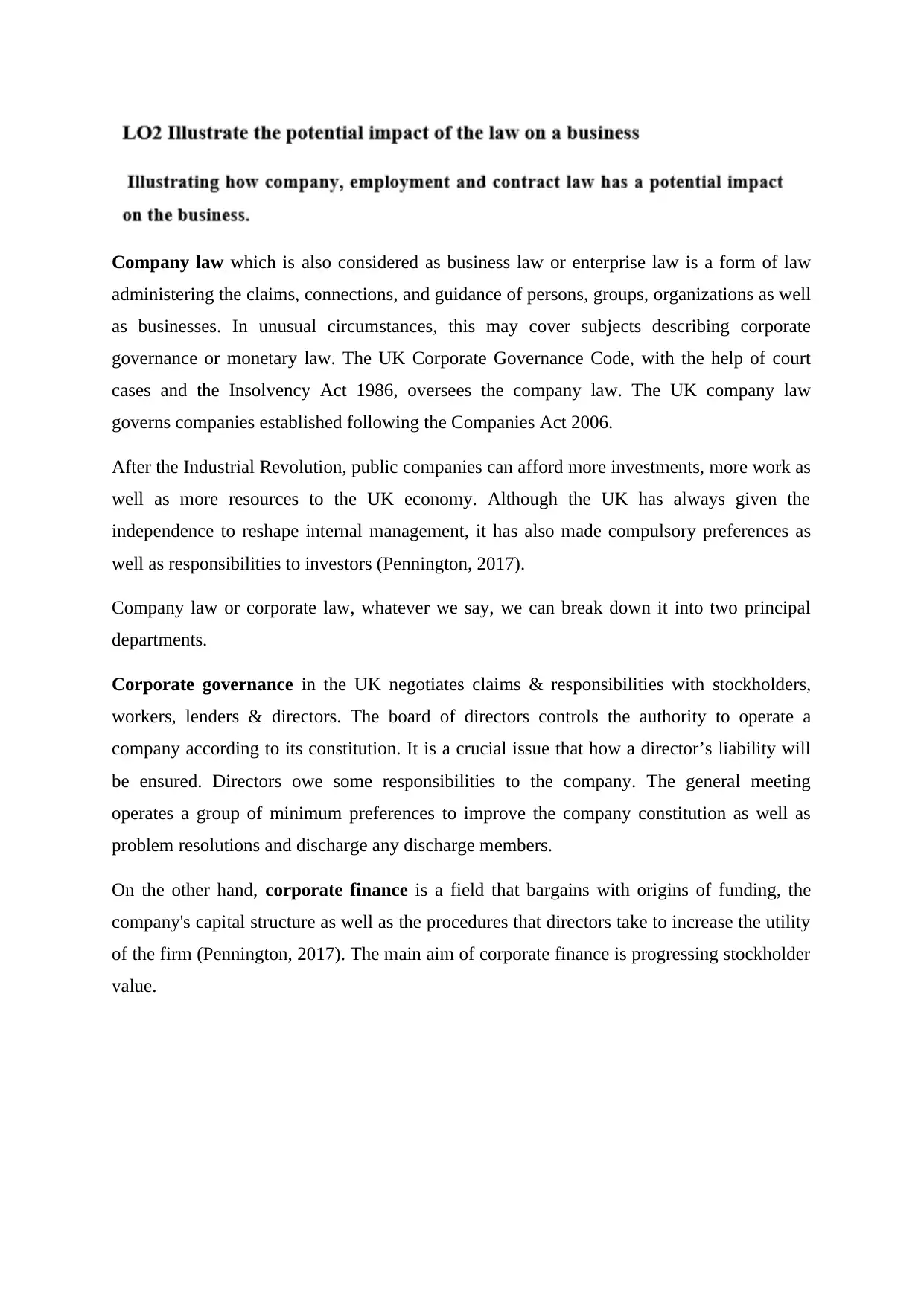
Company law which is also considered as business law or enterprise law is a form of law
administering the claims, connections, and guidance of persons, groups, organizations as well
as businesses. In unusual circumstances, this may cover subjects describing corporate
governance or monetary law. The UK Corporate Governance Code, with the help of court
cases and the Insolvency Act 1986, oversees the company law. The UK company law
governs companies established following the Companies Act 2006.
After the Industrial Revolution, public companies can afford more investments, more work as
well as more resources to the UK economy. Although the UK has always given the
independence to reshape internal management, it has also made compulsory preferences as
well as responsibilities to investors (Pennington, 2017).
Company law or corporate law, whatever we say, we can break down it into two principal
departments.
Corporate governance in the UK negotiates claims & responsibilities with stockholders,
workers, lenders & directors. The board of directors controls the authority to operate a
company according to its constitution. It is a crucial issue that how a director’s liability will
be ensured. Directors owe some responsibilities to the company. The general meeting
operates a group of minimum preferences to improve the company constitution as well as
problem resolutions and discharge any discharge members.
On the other hand, corporate finance is a field that bargains with origins of funding, the
company's capital structure as well as the procedures that directors take to increase the utility
of the firm (Pennington, 2017). The main aim of corporate finance is progressing stockholder
value.
administering the claims, connections, and guidance of persons, groups, organizations as well
as businesses. In unusual circumstances, this may cover subjects describing corporate
governance or monetary law. The UK Corporate Governance Code, with the help of court
cases and the Insolvency Act 1986, oversees the company law. The UK company law
governs companies established following the Companies Act 2006.
After the Industrial Revolution, public companies can afford more investments, more work as
well as more resources to the UK economy. Although the UK has always given the
independence to reshape internal management, it has also made compulsory preferences as
well as responsibilities to investors (Pennington, 2017).
Company law or corporate law, whatever we say, we can break down it into two principal
departments.
Corporate governance in the UK negotiates claims & responsibilities with stockholders,
workers, lenders & directors. The board of directors controls the authority to operate a
company according to its constitution. It is a crucial issue that how a director’s liability will
be ensured. Directors owe some responsibilities to the company. The general meeting
operates a group of minimum preferences to improve the company constitution as well as
problem resolutions and discharge any discharge members.
On the other hand, corporate finance is a field that bargains with origins of funding, the
company's capital structure as well as the procedures that directors take to increase the utility
of the firm (Pennington, 2017). The main aim of corporate finance is progressing stockholder
value.
Paraphrase This Document
Need a fresh take? Get an instant paraphrase of this document with our AI Paraphraser
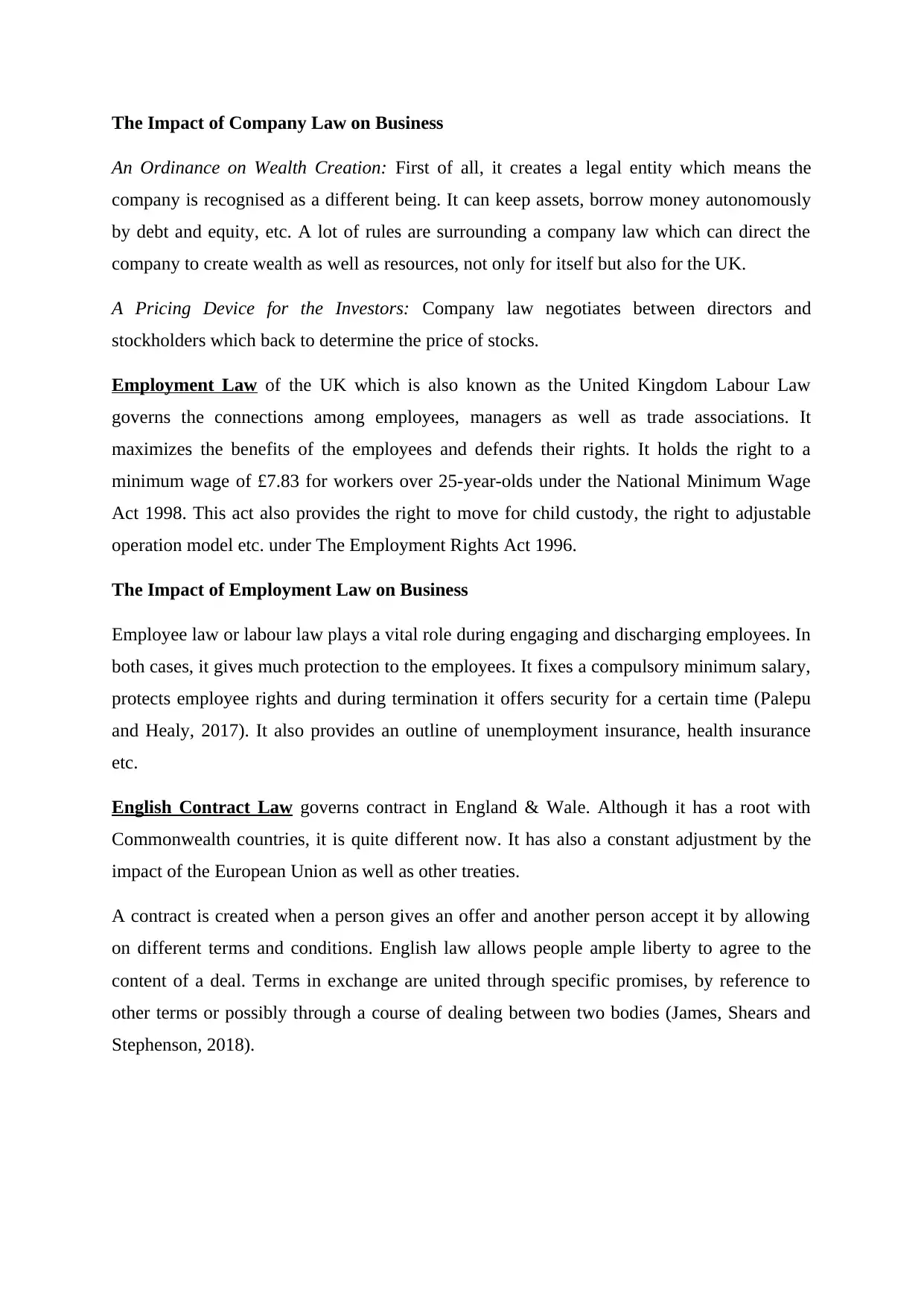
The Impact of Company Law on Business
An Ordinance on Wealth Creation: First of all, it creates a legal entity which means the
company is recognised as a different being. It can keep assets, borrow money autonomously
by debt and equity, etc. A lot of rules are surrounding a company law which can direct the
company to create wealth as well as resources, not only for itself but also for the UK.
A Pricing Device for the Investors: Company law negotiates between directors and
stockholders which back to determine the price of stocks.
Employment Law of the UK which is also known as the United Kingdom Labour Law
governs the connections among employees, managers as well as trade associations. It
maximizes the benefits of the employees and defends their rights. It holds the right to a
minimum wage of £7.83 for workers over 25-year-olds under the National Minimum Wage
Act 1998. This act also provides the right to move for child custody, the right to adjustable
operation model etc. under The Employment Rights Act 1996.
The Impact of Employment Law on Business
Employee law or labour law plays a vital role during engaging and discharging employees. In
both cases, it gives much protection to the employees. It fixes a compulsory minimum salary,
protects employee rights and during termination it offers security for a certain time (Palepu
and Healy, 2017). It also provides an outline of unemployment insurance, health insurance
etc.
English Contract Law governs contract in England & Wale. Although it has a root with
Commonwealth countries, it is quite different now. It has also a constant adjustment by the
impact of the European Union as well as other treaties.
A contract is created when a person gives an offer and another person accept it by allowing
on different terms and conditions. English law allows people ample liberty to agree to the
content of a deal. Terms in exchange are united through specific promises, by reference to
other terms or possibly through a course of dealing between two bodies (James, Shears and
Stephenson, 2018).
An Ordinance on Wealth Creation: First of all, it creates a legal entity which means the
company is recognised as a different being. It can keep assets, borrow money autonomously
by debt and equity, etc. A lot of rules are surrounding a company law which can direct the
company to create wealth as well as resources, not only for itself but also for the UK.
A Pricing Device for the Investors: Company law negotiates between directors and
stockholders which back to determine the price of stocks.
Employment Law of the UK which is also known as the United Kingdom Labour Law
governs the connections among employees, managers as well as trade associations. It
maximizes the benefits of the employees and defends their rights. It holds the right to a
minimum wage of £7.83 for workers over 25-year-olds under the National Minimum Wage
Act 1998. This act also provides the right to move for child custody, the right to adjustable
operation model etc. under The Employment Rights Act 1996.
The Impact of Employment Law on Business
Employee law or labour law plays a vital role during engaging and discharging employees. In
both cases, it gives much protection to the employees. It fixes a compulsory minimum salary,
protects employee rights and during termination it offers security for a certain time (Palepu
and Healy, 2017). It also provides an outline of unemployment insurance, health insurance
etc.
English Contract Law governs contract in England & Wale. Although it has a root with
Commonwealth countries, it is quite different now. It has also a constant adjustment by the
impact of the European Union as well as other treaties.
A contract is created when a person gives an offer and another person accept it by allowing
on different terms and conditions. English law allows people ample liberty to agree to the
content of a deal. Terms in exchange are united through specific promises, by reference to
other terms or possibly through a course of dealing between two bodies (James, Shears and
Stephenson, 2018).
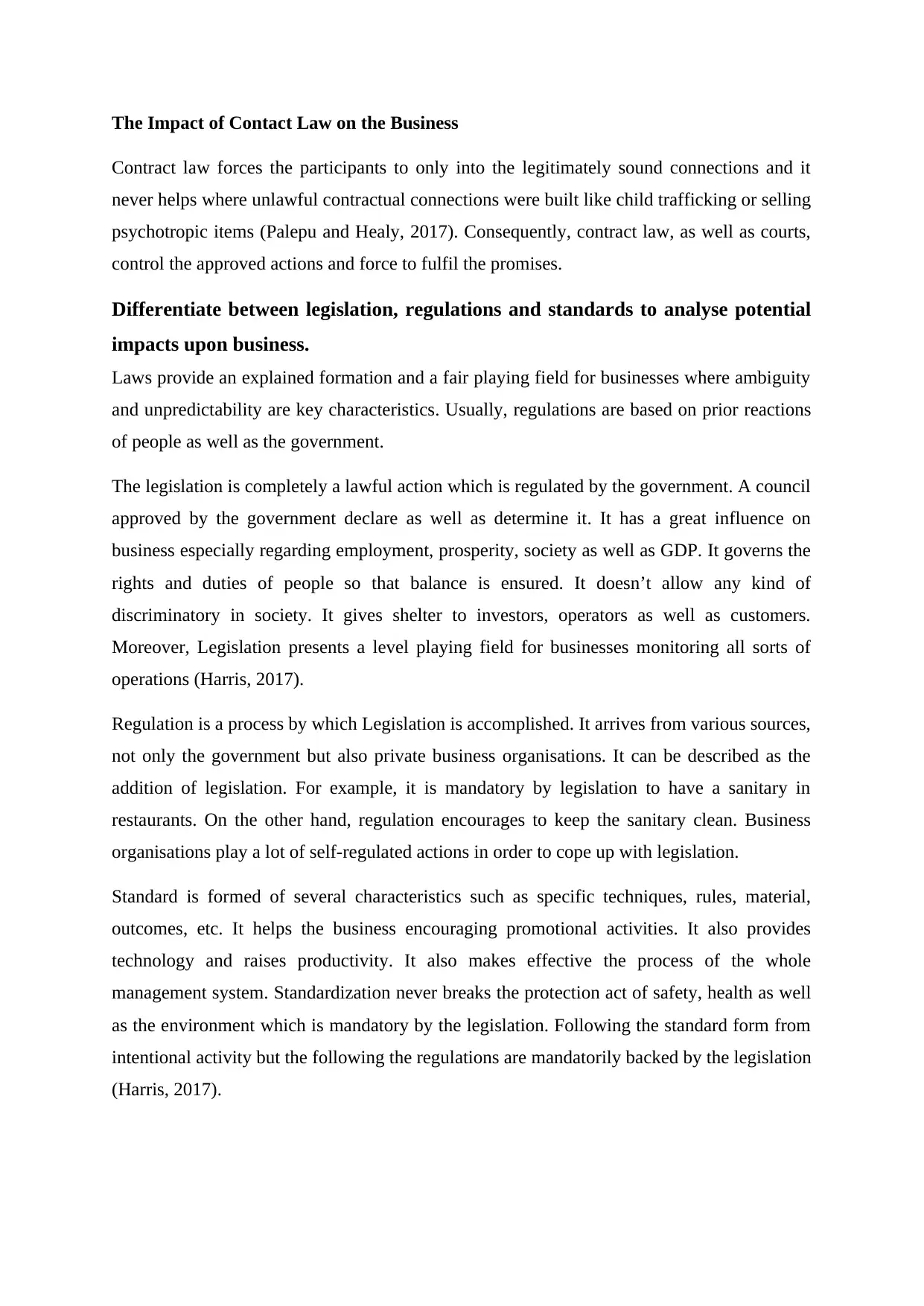
The Impact of Contact Law on the Business
Contract law forces the participants to only into the legitimately sound connections and it
never helps where unlawful contractual connections were built like child trafficking or selling
psychotropic items (Palepu and Healy, 2017). Consequently, contract law, as well as courts,
control the approved actions and force to fulfil the promises.
Differentiate between legislation, regulations and standards to analyse potential
impacts upon business.
Laws provide an explained formation and a fair playing field for businesses where ambiguity
and unpredictability are key characteristics. Usually, regulations are based on prior reactions
of people as well as the government.
The legislation is completely a lawful action which is regulated by the government. A council
approved by the government declare as well as determine it. It has a great influence on
business especially regarding employment, prosperity, society as well as GDP. It governs the
rights and duties of people so that balance is ensured. It doesn’t allow any kind of
discriminatory in society. It gives shelter to investors, operators as well as customers.
Moreover, Legislation presents a level playing field for businesses monitoring all sorts of
operations (Harris, 2017).
Regulation is a process by which Legislation is accomplished. It arrives from various sources,
not only the government but also private business organisations. It can be described as the
addition of legislation. For example, it is mandatory by legislation to have a sanitary in
restaurants. On the other hand, regulation encourages to keep the sanitary clean. Business
organisations play a lot of self-regulated actions in order to cope up with legislation.
Standard is formed of several characteristics such as specific techniques, rules, material,
outcomes, etc. It helps the business encouraging promotional activities. It also provides
technology and raises productivity. It also makes effective the process of the whole
management system. Standardization never breaks the protection act of safety, health as well
as the environment which is mandatory by the legislation. Following the standard form from
intentional activity but the following the regulations are mandatorily backed by the legislation
(Harris, 2017).
Contract law forces the participants to only into the legitimately sound connections and it
never helps where unlawful contractual connections were built like child trafficking or selling
psychotropic items (Palepu and Healy, 2017). Consequently, contract law, as well as courts,
control the approved actions and force to fulfil the promises.
Differentiate between legislation, regulations and standards to analyse potential
impacts upon business.
Laws provide an explained formation and a fair playing field for businesses where ambiguity
and unpredictability are key characteristics. Usually, regulations are based on prior reactions
of people as well as the government.
The legislation is completely a lawful action which is regulated by the government. A council
approved by the government declare as well as determine it. It has a great influence on
business especially regarding employment, prosperity, society as well as GDP. It governs the
rights and duties of people so that balance is ensured. It doesn’t allow any kind of
discriminatory in society. It gives shelter to investors, operators as well as customers.
Moreover, Legislation presents a level playing field for businesses monitoring all sorts of
operations (Harris, 2017).
Regulation is a process by which Legislation is accomplished. It arrives from various sources,
not only the government but also private business organisations. It can be described as the
addition of legislation. For example, it is mandatory by legislation to have a sanitary in
restaurants. On the other hand, regulation encourages to keep the sanitary clean. Business
organisations play a lot of self-regulated actions in order to cope up with legislation.
Standard is formed of several characteristics such as specific techniques, rules, material,
outcomes, etc. It helps the business encouraging promotional activities. It also provides
technology and raises productivity. It also makes effective the process of the whole
management system. Standardization never breaks the protection act of safety, health as well
as the environment which is mandatory by the legislation. Following the standard form from
intentional activity but the following the regulations are mandatorily backed by the legislation
(Harris, 2017).
⊘ This is a preview!⊘
Do you want full access?
Subscribe today to unlock all pages.

Trusted by 1+ million students worldwide
1 out of 27
Related Documents
Your All-in-One AI-Powered Toolkit for Academic Success.
+13062052269
info@desklib.com
Available 24*7 on WhatsApp / Email
![[object Object]](/_next/static/media/star-bottom.7253800d.svg)
Unlock your academic potential
Copyright © 2020–2025 A2Z Services. All Rights Reserved. Developed and managed by ZUCOL.
